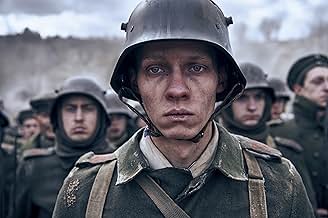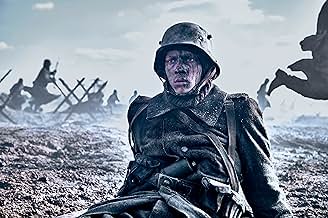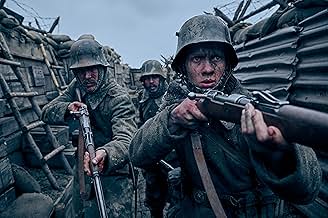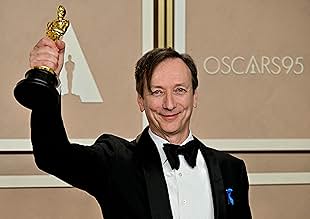Die grauenvollen Erlebnisse und das Elend eines jungen deutschen Soldaten an der Westfront während des Ersten Weltkrieges.Die grauenvollen Erlebnisse und das Elend eines jungen deutschen Soldaten an der Westfront während des Ersten Weltkrieges.Die grauenvollen Erlebnisse und das Elend eines jungen deutschen Soldaten an der Westfront während des Ersten Weltkrieges.
- 4 Oscars gewonnen
- 59 Gewinne & 89 Nominierungen insgesamt
Empfohlene Bewertungen
In the excellent 1930s original, war is seldom better summarised than by: 'It's dirty and painful to die for your country, when it comes to dying for your country it's better not to die at all. There are millions out there dying for their countries, and what good does it do?'.
It's a statement that applies just as well today, and complimented by this outstanding piece of film making too, which leaves us under no illusions of man's inhumanity to man. The performances are truly incredible, the technical achievement recreating scenes of war outstanding, and the messages as clear as any about the futility of armed combat and the inability of the human race to learn its lessons - even to this day. Not really a film to enjoy, but certainly a film to reflect on how far we haven't come since 1918, especially in a world that often seems so intent on pulling itself apart.
It's a statement that applies just as well today, and complimented by this outstanding piece of film making too, which leaves us under no illusions of man's inhumanity to man. The performances are truly incredible, the technical achievement recreating scenes of war outstanding, and the messages as clear as any about the futility of armed combat and the inability of the human race to learn its lessons - even to this day. Not really a film to enjoy, but certainly a film to reflect on how far we haven't come since 1918, especially in a world that often seems so intent on pulling itself apart.
I'm truly conflicted: "All Quiet on The Western Front" is a surprisingly stark & cold film upon first watch, capturing the futility of war, loss of youth & corruption of innocence with an unsettling lack of emotion throughout.
It's something I couldn't help but notice as I tuned in; usually in historical war films (like Sam Mendes' "1917" for instance, following events through the eyes of the opposing British side), we're accustomed to typically witnessing soldier's actions depicted as valiant & honourable, with a palpable sense of pride & patriotism embedded throughout - in pieces which are made to catalogue their innumerable brave achievements conducted by every-day folk (who, through no fault of their own, found themselves in the trenches), in spite of insurmountable odds comprehensively stacked against them... But here, there's no dignity in anything that transpires; obstacles aren't admirably overcome, the ensemble don't conduct themselves in a way which is befitting of their station, worthy of respect & none of the characters win any semblance of what could honestly be described as "glory"... They're just young, impressionable fools - drunk on propaganda - who have mindlessly partaken in the unwarranted military occupation of foreign land, where they are obviously not welcome by the inhabitants. Due to this, there's a void of relatability & moreover, all the team of participants can dream of - once they arrive at the front - or endeavour to guarantee for themselves is survival, not greatness.
However, despite this inability to sympathise being an irksome grievance of mine, in the production's defense, I suppose that's actually intentional & rather the whole point (?), since it's meant to tell the story through the perspective of the vanquished, not the conquerors, reflecting how naive recruits (who'd been fatally misled, in conscripting themselves & their families in the first place) were gradually numbed to their feelings by the constant mental & physical anguish inflicted upon them in a continuous onslaught of pointless offensives (instigated by their generals), once reality had firmly bitten & they'd been collectively disabused of this fantasy - but unfortunately, that noticeable detachment from any of the characters featured results in a somewhat muted response (as a viewer) when they're incessantly chewed up & spat out by the gratuitous violence - that's shot in a hauntingly raw, ominous way - they're repeatedly (& needlessly) thrust in to by the callous, cowardly officers, who arrogantly orchestrate the entire miserable situation that needn't last a single day longer.
Again, I suppose that only reaffirms the statement the creators are trying to make, wilfully juxtaposing intense sequences of suffering & pain with little sentimentality & ambivalence; the film chronicles how Germany treated (or more accurately, mistreated) its own people, offering up generations of its future citizens on the battlefield as sacrificial lambs, massacred at the altar of a poisonous, nationalistic ideology which had taken root within the governing population; boys - barely men, even some who weren't yet - were essentially reduced to nothing but disposable, unimportant objects, thoughtlessly discarded & simply replaced in a sadistic game & quest for absolute power (no matter the personal cost or price paid in blood) - an incalculable loss which (even by the time the armistice came in to effect) still wasn't enough to satiate the tyrannical desires of the few, controlling the many... And the movie does therefore (to its credit) accurately reflect that exact point in its portrayal of the poor cannon fodder by representing them as exactly that, & additionally lenses the apathy of the superiors (who give the indefensible orders) through a perspective of rightful, scornful contempt.
Hence, I can understand the creative intentions (depicting the utter, irredeemable meaninglessness; the wanton, senseless destruction) & the grim inhumanity of it all... Yet after seeing such horrors & heinous cruelties, I guess I felt like I wanted a purpose to everything I'd sat through by the time the credits started rolling - & thought I'd been cheated by the fact that there wasn't one. On the other hand, like I acknowledge earlier, I assume that's not accidental - & rather the understandably cynical, bitter & despondent conclusion the narrative decidedly wants the audience to come to by the time it reaches its unsatisfactory denouement; there is no discernible reason that could ever hope to justify the carnage we observe - the savagery that unfolds is simply slaughter for the sheer sake of it & the trauma experienced by all those affected was utterly preventable, had the invaders put aside their vanity & pride & sought to preserve peace which could've so effortlessly been maintained.
Plus, it does also show one massive miscalculation on the side of the victors; forcing the Germans in to reluctant submission & backing them in to signing an agreement with terms they couldn't accept would ultimately entrench resentful animosity that would act as a spark to light the fire of the 2nd World War, only a few decades later etc. Foreshadowing what was to come before anyone could predict the oncoming calamity. Due to this, irrespective of what I think (or more aptly, how little it evoked within me), I must concede that it remains a success, regardless - because the project undoubtedly achieved its goal in a commendably brutal & unflinching manner - & I can't plausibly surmise any alternative which would've resulted in something better.
It's something I couldn't help but notice as I tuned in; usually in historical war films (like Sam Mendes' "1917" for instance, following events through the eyes of the opposing British side), we're accustomed to typically witnessing soldier's actions depicted as valiant & honourable, with a palpable sense of pride & patriotism embedded throughout - in pieces which are made to catalogue their innumerable brave achievements conducted by every-day folk (who, through no fault of their own, found themselves in the trenches), in spite of insurmountable odds comprehensively stacked against them... But here, there's no dignity in anything that transpires; obstacles aren't admirably overcome, the ensemble don't conduct themselves in a way which is befitting of their station, worthy of respect & none of the characters win any semblance of what could honestly be described as "glory"... They're just young, impressionable fools - drunk on propaganda - who have mindlessly partaken in the unwarranted military occupation of foreign land, where they are obviously not welcome by the inhabitants. Due to this, there's a void of relatability & moreover, all the team of participants can dream of - once they arrive at the front - or endeavour to guarantee for themselves is survival, not greatness.
However, despite this inability to sympathise being an irksome grievance of mine, in the production's defense, I suppose that's actually intentional & rather the whole point (?), since it's meant to tell the story through the perspective of the vanquished, not the conquerors, reflecting how naive recruits (who'd been fatally misled, in conscripting themselves & their families in the first place) were gradually numbed to their feelings by the constant mental & physical anguish inflicted upon them in a continuous onslaught of pointless offensives (instigated by their generals), once reality had firmly bitten & they'd been collectively disabused of this fantasy - but unfortunately, that noticeable detachment from any of the characters featured results in a somewhat muted response (as a viewer) when they're incessantly chewed up & spat out by the gratuitous violence - that's shot in a hauntingly raw, ominous way - they're repeatedly (& needlessly) thrust in to by the callous, cowardly officers, who arrogantly orchestrate the entire miserable situation that needn't last a single day longer.
Again, I suppose that only reaffirms the statement the creators are trying to make, wilfully juxtaposing intense sequences of suffering & pain with little sentimentality & ambivalence; the film chronicles how Germany treated (or more accurately, mistreated) its own people, offering up generations of its future citizens on the battlefield as sacrificial lambs, massacred at the altar of a poisonous, nationalistic ideology which had taken root within the governing population; boys - barely men, even some who weren't yet - were essentially reduced to nothing but disposable, unimportant objects, thoughtlessly discarded & simply replaced in a sadistic game & quest for absolute power (no matter the personal cost or price paid in blood) - an incalculable loss which (even by the time the armistice came in to effect) still wasn't enough to satiate the tyrannical desires of the few, controlling the many... And the movie does therefore (to its credit) accurately reflect that exact point in its portrayal of the poor cannon fodder by representing them as exactly that, & additionally lenses the apathy of the superiors (who give the indefensible orders) through a perspective of rightful, scornful contempt.
Hence, I can understand the creative intentions (depicting the utter, irredeemable meaninglessness; the wanton, senseless destruction) & the grim inhumanity of it all... Yet after seeing such horrors & heinous cruelties, I guess I felt like I wanted a purpose to everything I'd sat through by the time the credits started rolling - & thought I'd been cheated by the fact that there wasn't one. On the other hand, like I acknowledge earlier, I assume that's not accidental - & rather the understandably cynical, bitter & despondent conclusion the narrative decidedly wants the audience to come to by the time it reaches its unsatisfactory denouement; there is no discernible reason that could ever hope to justify the carnage we observe - the savagery that unfolds is simply slaughter for the sheer sake of it & the trauma experienced by all those affected was utterly preventable, had the invaders put aside their vanity & pride & sought to preserve peace which could've so effortlessly been maintained.
Plus, it does also show one massive miscalculation on the side of the victors; forcing the Germans in to reluctant submission & backing them in to signing an agreement with terms they couldn't accept would ultimately entrench resentful animosity that would act as a spark to light the fire of the 2nd World War, only a few decades later etc. Foreshadowing what was to come before anyone could predict the oncoming calamity. Due to this, irrespective of what I think (or more aptly, how little it evoked within me), I must concede that it remains a success, regardless - because the project undoubtedly achieved its goal in a commendably brutal & unflinching manner - & I can't plausibly surmise any alternative which would've resulted in something better.
Germany, May 1917. 17-year-old Paul Baumer enthusiastically enlists in the German army and heads off to war. His head is filled with patriotism, honour, visions of heroism and the confidence that Germany will win the war. He soon learns that his impressions of war are far from the reality.
Erich Maria Remarque's "All Quiet on the Western Front" was first published in 1929. It was quite revolutionary, depicting the horrific reality of war rather than the glamourous, sanitised version. In a sense it was the first anti-war novel. It was so unflinching in its portrayal of WW1 that the Nazi party regarded it as treasonous and had the book banned and stripped Remarque of his German citizenship, causing him to flee to Switzerland and ultimately the US.
In 1930 Hollywood made the book into a movie. It was superb, capturing well the horrors that Remarque depicted in his book. It deservedly won the Oscar for Best Picture (and Best Director) in 1930.
In 1979 it was adapted again, this time as a made-for-TV movie. Despite being directed by Delbert Mann and boasting a star-studded cast (Richard Thomas, Ernest Borgnine, Ian Holm, Donald Pleasance) this version was far from being in the same league as the 1930 version and didn't do the book justice. It is quite tame and the performances are quite subdued.
This, the 2022 version, once again captures the essence of the book and is quite unflinching in its portrayal of war. Graphic scenes and realistic plot show the wastefulness and horror of war.
Not as good as the 1930 version though: the characters aren't as fully developed, limiting engagement, and the plot feels a bit padded. A few drawn out scenes could easily have been shorter without losing any detail. Some style-over-substance elements too as the director went overboard with the special effects he had at his disposal (the French counter-attack with tanks and flamethrowers is a good example). The droning sound didn't help either (clearly the director has watched Christopher Nolan's "Dunkirk").
Erich Maria Remarque's "All Quiet on the Western Front" was first published in 1929. It was quite revolutionary, depicting the horrific reality of war rather than the glamourous, sanitised version. In a sense it was the first anti-war novel. It was so unflinching in its portrayal of WW1 that the Nazi party regarded it as treasonous and had the book banned and stripped Remarque of his German citizenship, causing him to flee to Switzerland and ultimately the US.
In 1930 Hollywood made the book into a movie. It was superb, capturing well the horrors that Remarque depicted in his book. It deservedly won the Oscar for Best Picture (and Best Director) in 1930.
In 1979 it was adapted again, this time as a made-for-TV movie. Despite being directed by Delbert Mann and boasting a star-studded cast (Richard Thomas, Ernest Borgnine, Ian Holm, Donald Pleasance) this version was far from being in the same league as the 1930 version and didn't do the book justice. It is quite tame and the performances are quite subdued.
This, the 2022 version, once again captures the essence of the book and is quite unflinching in its portrayal of war. Graphic scenes and realistic plot show the wastefulness and horror of war.
Not as good as the 1930 version though: the characters aren't as fully developed, limiting engagement, and the plot feels a bit padded. A few drawn out scenes could easily have been shorter without losing any detail. Some style-over-substance elements too as the director went overboard with the special effects he had at his disposal (the French counter-attack with tanks and flamethrowers is a good example). The droning sound didn't help either (clearly the director has watched Christopher Nolan's "Dunkirk").
Just got off watching this Netflix version of the classic.
I vaguely remember the 1979 version with Ernest Borgnine (7/10) and I certainly remember watching the original 1930 film. Both powerful in their own ways. The 1930 film is the best of the three - with first class black & white photography, and all done in that particular way of German story telling. In 1930, the events were very recent - just 13 years previous. Every male over age 30 in German cinemas would have had direct experience. It must have been awful for those audiences to watch the apocalyptic battlefield scenes - still some of the most graphic and numbing ever filmed. My rating 8/10.
So how does this one from Netflix in 2022 stand up then? Well sadly, not that tall.
It's bleak, graphic, actually depressing. An assault on the senses. Sure - it really conveys the impression of the horrors and desperation of trench warfare. But that's all. Maybe that's all it's supposed to do? Maybe that's, as a matter of fact all there was: mayhem and horror? There's nothing to redeem it. Again - that's the point: there's nothing good or glorius about war. Only the opposite.
The men who went to war then, as now, are not all evil men bent on barbarism and terror. All Quiet on the Western Front (all versions) shows us that those who go to war are just normal people - people like you and me. Good people go to war. Normal people. They end up having to see terrible things, do terrible things, to kill or be killed. That's the stark reality. This film certainly shows us that, but there is no upside, no redemption. There are little glimpses of humanity in the friendships, but that's all.
I vaguely remember the 1979 version with Ernest Borgnine (7/10) and I certainly remember watching the original 1930 film. Both powerful in their own ways. The 1930 film is the best of the three - with first class black & white photography, and all done in that particular way of German story telling. In 1930, the events were very recent - just 13 years previous. Every male over age 30 in German cinemas would have had direct experience. It must have been awful for those audiences to watch the apocalyptic battlefield scenes - still some of the most graphic and numbing ever filmed. My rating 8/10.
So how does this one from Netflix in 2022 stand up then? Well sadly, not that tall.
It's bleak, graphic, actually depressing. An assault on the senses. Sure - it really conveys the impression of the horrors and desperation of trench warfare. But that's all. Maybe that's all it's supposed to do? Maybe that's, as a matter of fact all there was: mayhem and horror? There's nothing to redeem it. Again - that's the point: there's nothing good or glorius about war. Only the opposite.
The men who went to war then, as now, are not all evil men bent on barbarism and terror. All Quiet on the Western Front (all versions) shows us that those who go to war are just normal people - people like you and me. Good people go to war. Normal people. They end up having to see terrible things, do terrible things, to kill or be killed. That's the stark reality. This film certainly shows us that, but there is no upside, no redemption. There are little glimpses of humanity in the friendships, but that's all.
A fascinating film with potential that was never fully achieved. "All Quiet on the Western Front" does not rely solely on shock value to disturb its audience; instead, it uses the horrors of war to sober them with facts and dismal realities. The film's story was worth telling; it left an impression long after the credits rolled. It dealt with many weighty themes, including a young man's journey through war, the difficulties of combat, the cruelty of desperation, and the value of friendship and camaraderie, all of which were handled with grace and artistry. Furthermore, it boasted first-rate production values, breathtaking visuals, a terrific score (although maybe a tad bit over the top), and stellar acting. Although there is much to praise about the film, "All Quiet on the Western Front" is ultimately hampered by its drawn-out length, the plot dragging in spots, and several confusing moments. All the pieces were in place for "All Quiet on the Western Front" to be the best picture of the year, and in some respects, it is. Fans of the genre, or anyone who appreciates a well-made film, should not miss this film despite its limitations.
Rating: 7.5/10 (Impressive)
Rating: 7.5/10 (Impressive)
Wusstest du schon
- WissenswertesErich Maria Remarque's book was inspired by his own experiences as a German soldier in World War I. Remarque fought in the trenches and the novel is notable for its realistic depiction of the horrors of battle, and the trouble soldiers face during and even after the fighting.
- PatzerBy the end, Germany's delegation to Rethondes appears indignant as the terms and conditions of armistice are quoted by Mathias Erzberger, namely forfeiting submarines, planes, weapons and so on; what is read there was not in the November 11, 1918 capitulation act but was imposed upon Germany next year in the Treaty of Versailles.
- Zitate
Matthias Erzberger: All that's left separating us from an armistice is false pride.
- VerbindungenFeatured in Business Now: Folge vom 19. Oktober 2022 (2022)
- SoundtracksEbben? Ne andrò lontana ('La Wally', Act 1)
Written by Alfredo Catalani and Luigi Illica
Performed by Maria Luigia Borsi
Top-Auswahl
Melde dich zum Bewerten an und greife auf die Watchlist für personalisierte Empfehlungen zu.
Details
- Erscheinungsdatum
- Herkunftsländer
- Offizieller Standort
- Sprachen
- Auch bekannt als
- Sin novedad en el frente
- Drehorte
- Produktionsfirmen
- Weitere beteiligte Unternehmen bei IMDbPro anzeigen
- Laufzeit
- 2 Std. 28 Min.(148 min)
- Farbe
- Sound-Mix
- Seitenverhältnis
- 2.39 : 1
Zu dieser Seite beitragen
Bearbeitung vorschlagen oder fehlenden Inhalt hinzufügen


































